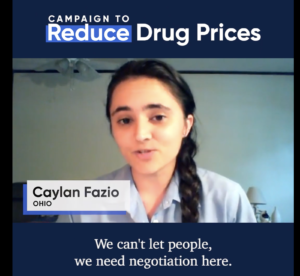Washington, DC – Today, Protect Our Care is releasing a new video as part of Week 4 of the Lower Rx Summer Campaign that highlights how high drug prices impact women disproportionately. Throughout the week, Protect Our Care will host events and release additional research to demonstrate the urgency for reform to bring down drug prices for women, including allowing Medicare to negotiate drug prices for everyone.
Earlier this week, Protect Our Care released a report showing that women are more likely than their male counterparts to use prescription drugs. Economic and social inequality leave women with lower pay and less wealth, making it harder to afford health care. Women are also more likely to be caregivers, leaving them responsible for purchasing medications for family members. As a result, women are more likely than men to skip needed prescriptions because of cost. This problem is only getting worse: A 2019 Gallup poll found that the gender gap for prescription drug affordability is growing, with 28 percent of women unable to afford a prescribed medication in the previous year, compared to 18 percent of men.

Remaining Theme Weeks for Lower Rx Summer
Week 4 (June 28): How High Drug Prices Hurt Women
Week 5 (July 5): How High Drug Prices Hurt People with Disabilities
Week 6 (July 12): How High Drug Prices Hurt People of Color
Week 7 (July 19): How High Drug Prices Hurt Small Businesses
Week 8 (July 26): How High Drug Prices Hurt Children
“This video shows the impacts of Big Pharma’s greed, particularly for women who carry more of the burden from the high prices of prescription drugs,” said Protect Our Care Communications Director Anne Shoup. “Americans should not have to pay three times more for the same medicines as people in other countries, and unfortunately more women are finding themselves in the impossible position of choosing between paying for lifesaving drugs and paying for housing or food. As the nation recovers from the coronavirus pandemic, ensuring access to affordable health care and lowering the cost of prescription drugs has never been more critical for American women.”

